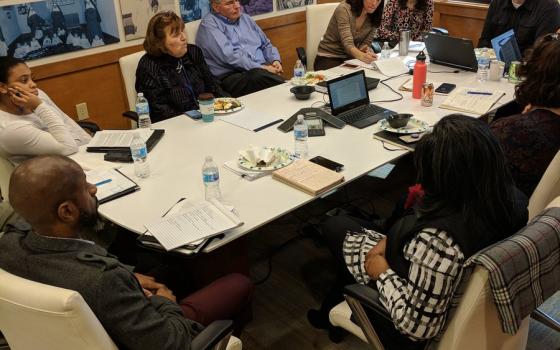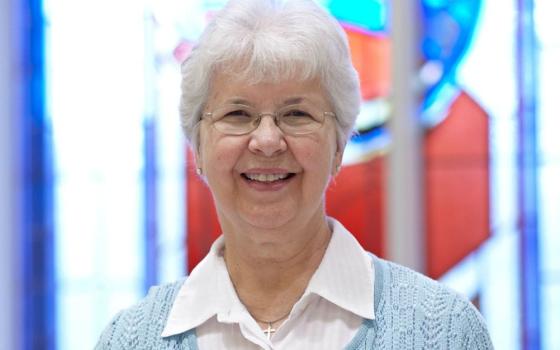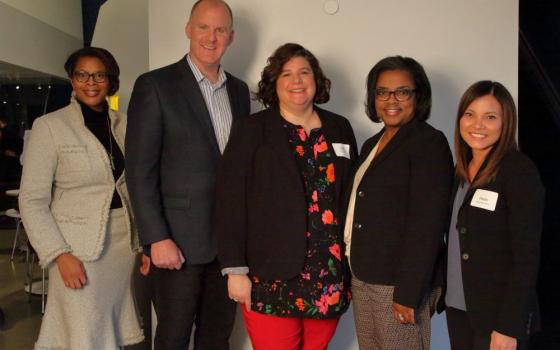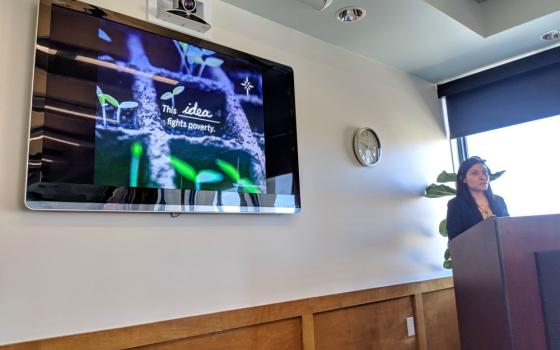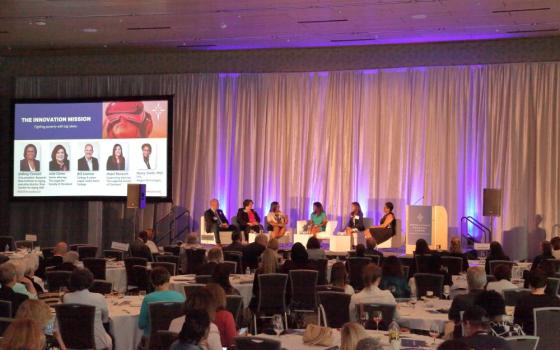A Cleveland foundation started by sisters says it's on to a new way to "disrupt the cycle of poverty" by funding leaders with big ideas that still need incubation. Innovation Mission is a pilot project of the Sisters of Charity Foundation of Cleveland, whose roots are in the Sisters of Charity of St. Augustine.
The 18-month-long effort, officially completed in June but with projects that are still emerging, gave $20,000 of seed funding, publicity, structure, creative-thinking workshops and coaching to five people with anti-poverty ideas touching on housing, education, jobs and other aspects.
"Our thinking was if we select five and get one project that is successful in impacting poverty, we will be absolutely thrilled," said Susanna Krey, president of the Sisters of Charity Foundation of Cleveland. "When we were done, our board felt we had really impacted a significant amount of the issues in poverty with all five of these candidates."
Fellowship recipients also affirmed the positive impact of Innovation Mission. The fellows, who took part in an intensive series of workshops, research, reports and publicity, are all at a different stages: One program is up and running. Another has effected change in policy. Another is fully sketched out and awaiting funding.
While Innovation Mission is a few steps removed from the sisters in the foundation name, the spirit of those sisters comes through in several aspects of the project. Krey and Sr. Marian Durkin of the Sisters of Charity of St. Augustine, a foundation board member, point to a pioneering attitude and a common passion for people who live in poverty.
"We [sisters] have been noted for meeting unmet needs; that's been important from day one," Durkin said.
The community started an orphanage not long after its start in 1851, founded hospitals, ran schools and initiated services for immigrants, people who are homeless, those with HIV/AIDS and others.
"We've always had an entrepreneurial spirit," Durkin said, noting that her community, like Innovation Mission, also encouraged members to vet their ministry ideas. When she wanted to start a ministry for people living with HIV/AIDS, before jumping on board, "they asked me, 'Have you really researched this? Have you done your homework?' "
One other dimension of religious life also unexpectedly emerged as Innovation Mission hummed along: a sense of community among the fellows.
"Camaraderie was not a goal, but we became the support for another," said grant recipient Dabney Conwell.
The fellows largely agree on three other aspects of Innovation Mission: It gave them much-needed structure and door-opening credibility; it pushed them to do research on, think deeply about and refine their ideas; and it was exhausting because they still had their day jobs.
"Innovation Mission provided me with the structure to support and build out the plan. That moved it from idea to implementation," said fellow Bill Leamon, who compared the fellowship to signing up for a class. "It forces you to show up. It forces you to do the reading. It forces you to do the homework."
The fellows said the four professional development workshops made them think long and hard and revise their original ideas.
"It was really important that we consider not just what other people are doing, but to think about implementation early on. ... What are the barriers, and how are you going to address them?" fellow Hazel Remesch said.
Just as the five fellows involved in the first Innovation Mission are still working on their programs, the foundation, too, plans to continue. Krey said she and her staff hope to make adjustments and then recruit a new class of fellows in 2020.
Here is a snapshot of each project, all aimed at stopping the cycle of poverty that affects a third of the Cleveland population.
Bill Leamon: Mentors for new college students
As a career coach and professor at Notre Dame College in South Euclid, Ohio, Bill Leamon wanted to help more low-income students who are the first in their family to go to college "navigate the complexity" of higher education, which for them "is like landing in a foreign country," he said.
Leamon and the foundation say 60% of such students feel unprepared for college, and 60% end up taking jobs that don't require a college degree. Leamon said for these students, college can be confusing and culturally different, and their parents are unable to help them through the challenges because they do not have experience in that sphere.
Leamon wanted to match every college-bound student from Cleveland public schools with a mentor, using an app that keeps both parties communicating after an initial face-to-face meeting. But when another program emerged to serve those students, he pivoted to Catholic and charter schools in Cleveland that serve people who live in poverty, and he expanded his program beyond mentoring.
Today, his initiative, collegetocareer.org, does college prep presentations at high schools, college mentoring aided by an app, and career coaching. Leamon said he hopes to underwrite the site by offering the same services to paying clients and through sales of his forthcoming book, College Success 101.
Hazel Remesch: Help for those facing eviction
Hazel Remesch, a lawyer for Legal Aid Society of Cleveland, started out with the idea that more Clevelanders facing eviction should have a lawyer since an eviction increases the intensity of poverty and shuts down the avenues out of it.
"Housing is a basic human need," she said. "You cannot succeed in work or school without a stable roof over your head."
Through Innovation Mission, Remesch formed an advisory board with local legal, political and community representatives. They researched ways other cities were handling legal counsel for people dealing with eviction and met with civic leaders in New York City and Washington, D.C.
Remesch and her team formed the Housing Justice Alliance, which has pulled together draft legislation for a right to counsel when facing eviction to be introduced this summer to the Cleveland City Council. Meanwhile, the alliance is celebrating a successful effort to create a process for Clevelanders to seal evictions so they are not public records, making it easier to secure jobs and housing. In the first six months since that victory, 30 people sought this protection.
Dabney Conwell: Helping seniors eat right following hospitalization
Dabney Conwell wanted to give vulnerable senior citizens good food directly after a hospital stay. She is vice president of Benjamin Rose Institute on Aging and executive director of Rose Centers for Aging Well, both in Cleveland.
"We deliver 600 meals to homebound seniors every day, and what we were finding was that there is a significant number of older adults who were discharging from the hospital into food-insecure homes," she said. "They're socially isolated, so they don't have friends or relatives to come and prepare food for them. We wondered: How could we respond to them?"
She reasoned that nutritious meals were as necessary as medicine to recover fully and avoid rehospitalization or further decline. Why not have a medical prescription for meals? And why not deliver them?
The Innovation Mission process helped her research and think through her idea. Fresh or frozen food? How to pay the costs of food and delivery? Which type of hospitalizations most needed this service? How could she make her idea an institutionalized medical process, not a program that might come and go?
She learned she had to argue the economics of her proposal as much as the humanitarian benefit. Conwell said a hospital readmission triggered by poor nutrition costs on average $23,000, whereas a medically tailored meal costs $5. She has put together a pilot process — Nutrition Solution — and continues to seek funding.
Penny Smith: Getting parents jobs so they can pay child support
Penny Smith wanted to apply her many years in workforce development to help low-income fathers secure the jobs they need to pay child support. Without well-paying jobs, fathers remain poor, and so do their children: U.S. Census Bureau figures show nearly a third of custodial parents fail to receive child support payments.
Smith used her time with Innovation Mission to develop Keys to Degrees, a web-based software that would integrate with Ohio Means Jobs, the state employment agency, and the process currently used by child-support caseworkers. Smith's day job is CEO of Alegria Technologies and Consulting, a company that provides technology to education and nonprofit organizations.
While a fellow, she tested the concept for her software, partnering with Ohio State University to evaluate feedback from fathers and employment specialists, both of whom found the approach useful.
Currently, she is developing a beta version of the software and seeking funding. Having first conceived of the idea of Keys to Degrees in 2004, she said is thrilled at the progress she's made through Innovation Mission.
"It has reinvigorated an idea that I thought would never see the light of day," she said in a foundation-produced video.
Julie Cortes: Aiding low-income entrepreneurs
After years of helping people who live in poverty with employment problems, Legal Aid Society lawyer Julie Cortes wanted to help them be in the driver's seat for earning income. What if low-income people got the support they needed to succeed in running barber shops, boutiques or restaurants? New small businesses could also add economic life to languishing neighborhoods, she thought.
Her fellowship research revealed a number of Cleveland groups that help incubate small businesses, but none specifically targeted those who are low income to understand their education and cultures.
With support from Innovation Mission, Cortes brought together existing Cleveland groups, around 30 low-income entrepreneurs, and leaders from MORTAR in Cincinnati, an organization with the same vision as Cortes. Next, she hopes MORTAR will partner with a local group to begin work in Cleveland.
Meanwhile, "I'm fleshing out details for a legal services clinic," she said. Legal Aid Society will house the clinic, which will give individually tailored legal help to cash-strapped entrepreneurs.
[Carol Schuck Scheiber is an independent writer and editor in Ohio whose major focus for many years has been on Catholic vocations and related topics.]
